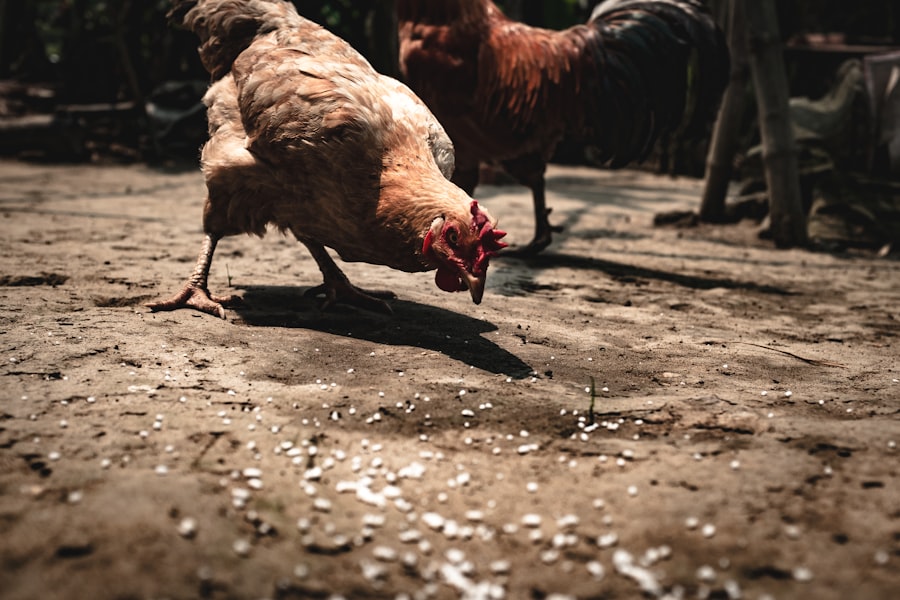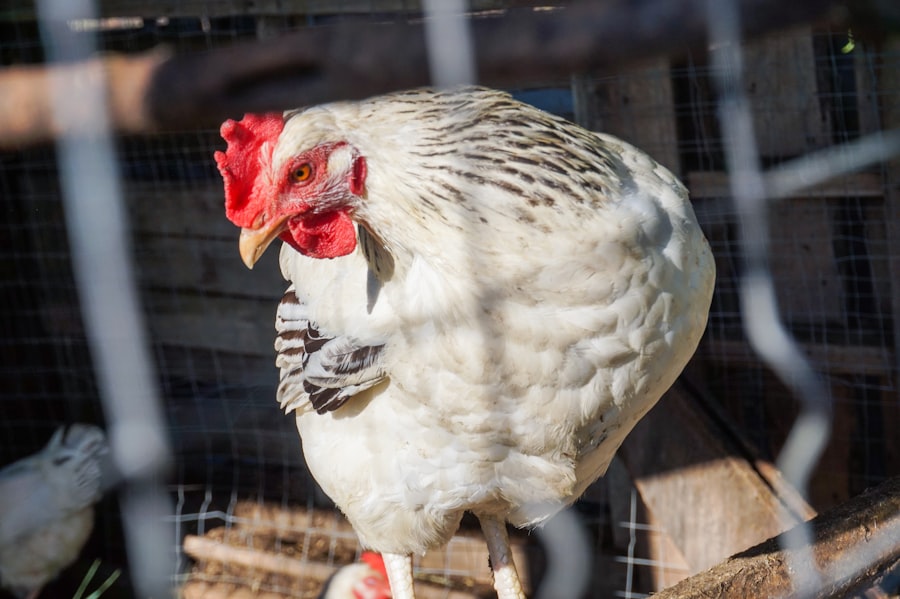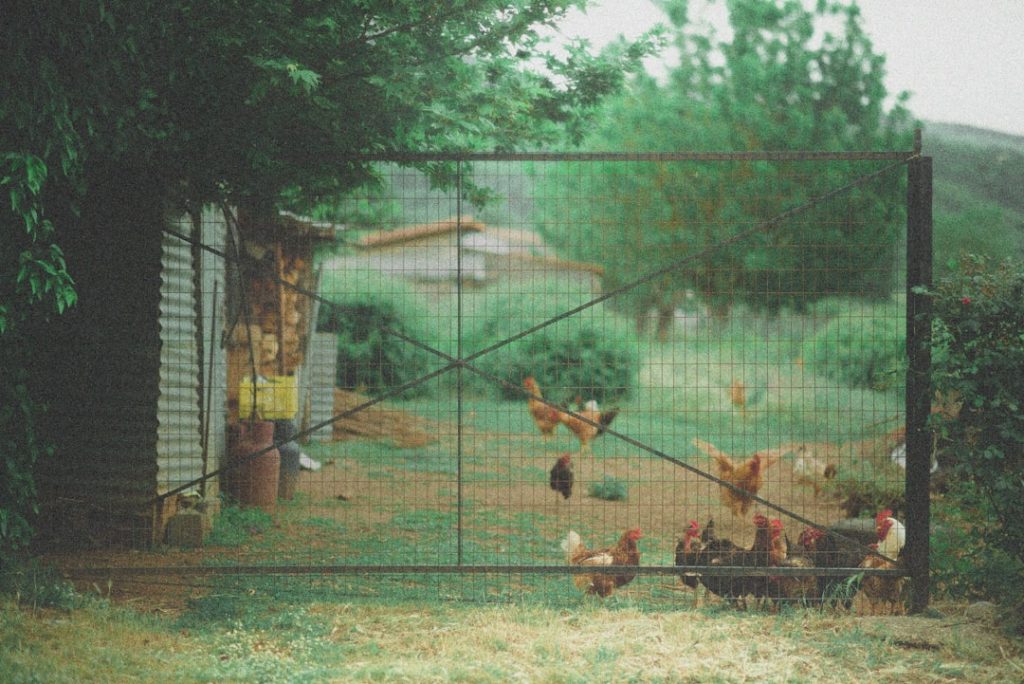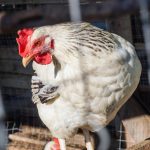Chickens and turkeys are domesticated birds commonly raised for meat and eggs. Chickens, typically smaller in size, are widely found on farms and in backyard coops. They come in numerous breeds with diverse characteristics.
Chickens are prolific egg layers and are often kept for this purpose. Turkeys are larger birds primarily raised for meat production. They are recognized for their distinctive vocalization, known as gobbling, and are frequently associated with holiday meals, particularly in the United States.
Both species are social animals that flourish in group environments. They exhibit curious and inquisitive behaviors and can form strong social bonds within their flocks. Chickens and turkeys are natural foragers, spending considerable time pecking and scratching the ground for food.
Both require access to clean water, appropriate shelter, and protection from predators to maintain their health and well-being. While chickens and turkeys share some behavioral traits and basic needs, there are significant differences between the two species. These differences can affect their interactions when housed together and may influence management practices in mixed-species settings.
Table of Contents
Key Takeaways
- Chickens and turkeys have different behaviors and social structures, but they can coexist in the same environment.
- Chickens are generally more dominant and may keep turkeys away from food and resources.
- Factors such as space, food availability, and flock size can affect the relationship between chickens and turkeys.
- Keeping chickens and turkeys together can provide pest control, companionship, and a diverse range of products such as eggs and meat.
- To manage chickens and turkeys together, provide ample space, separate feeding areas, and monitor their interactions to ensure a harmonious relationship.
The Behavior of Chickens and Turkeys
Chickens are known for their social nature and hierarchical structure within their flock. They establish a pecking order, with dominant individuals asserting their authority over subordinate members. This can lead to aggressive behavior, particularly during times of stress or when resources are limited.
Foraging and Communication
Chickens also have a strong instinct to forage for food, which can lead to scratching and pecking at the ground in search of insects, seeds, and other edible items. Additionally, chickens are known for their vocalizations, including clucking, crowing, and squawking, which they use to communicate with one another.
Turkey Behavior and Characteristics
Turkeys also exhibit social behavior within their flock, forming strong bonds with other birds and establishing a pecking order. However, turkeys are generally less aggressive than chickens and are known for their calm and gentle demeanor. They are also highly vocal birds, using a variety of calls and sounds to communicate with one another. Turkeys are also known for their curious nature and can be quite playful, particularly when they are young.
Roosting Behavior
Additionally, turkeys have a strong instinct to roost in trees at night, which is a behavior that is not typically seen in chickens.
Do Chickens Keep Turkeys Away?

The relationship between chickens and turkeys can vary depending on a number of factors, including the individual personalities of the birds, the size of the flock, and the availability of resources such as food and space. In some cases, chickens may keep turkeys away from certain areas or resources within their shared environment. This can be particularly true if the chickens are more dominant or aggressive than the turkeys, leading to competition for food or space.
Additionally, chickens may exhibit territorial behavior, particularly when it comes to nesting sites or roosting areas, which can impact the ability of turkeys to access these resources. On the other hand, turkeys may also have an impact on the behavior of chickens within a shared environment. Turkeys are generally larger and more powerful birds than chickens, which can lead to them asserting dominance over the smaller birds.
This can result in chickens being kept away from certain areas or resources within the environment, particularly if the turkeys are more assertive or aggressive in their behavior. Additionally, turkeys may exhibit territorial behavior when it comes to nesting or roosting sites, which can impact the ability of chickens to access these resources.
Factors Affecting the Relationship Between Chickens and Turkeys
There are several factors that can influence the relationship between chickens and turkeys when they are kept together in a shared environment. One important factor is the size and composition of the flock. Larger flocks may have more opportunities for social interactions between chickens and turkeys, while smaller flocks may lead to increased competition for resources.
Additionally, the age and sex of the birds can impact their behavior towards one another. For example, young birds may be more playful and curious, while older birds may be more assertive and dominant. The availability of resources such as food, water, shelter, and space can also impact the relationship between chickens and turkeys.
If resources are limited, it can lead to increased competition and aggression between the birds. Providing ample space and resources for both chickens and turkeys can help to minimize conflict and promote positive interactions between the two species. Additionally, the presence of predators or other environmental stressors can impact the behavior of both chickens and turkeys, leading to changes in their social dynamics and interactions with one another.
Benefits of Keeping Chickens and Turkeys Together
There are several benefits to keeping chickens and turkeys together in a shared environment. One benefit is that both species can help to control pests such as insects and weeds through their natural foraging behavior. Chickens are known for their ability to scratch and peck at the ground in search of insects, while turkeys are skilled at hunting for small animals such as mice and snakes.
By working together, chickens and turkeys can help to keep pest populations in check, reducing the need for chemical pesticides or other pest control methods. Another benefit of keeping chickens and turkeys together is that they can provide companionship and social interaction for one another. Both species are social animals that thrive in group settings, and they can form strong bonds with members of their own species as well as with individuals from other species.
This can help to reduce stress and boredom within the flock, leading to improved overall welfare for both chickens and turkeys. Additionally, keeping multiple species together can help to promote diversity within the flock, leading to a more dynamic and interesting environment for all of the birds involved.
Tips for Managing Chickens and Turkeys Together

Creating a Harmonious Environment
When keeping chickens and turkeys together, providing ample space and resources such as food, water, shelter, and roosting areas can help to minimize competition and aggression between the two species.
Monitoring Behavior and Providing Enrichment
It is also important to monitor the behavior of the birds closely and intervene if any signs of aggression or stress are observed. Additionally, providing enrichment such as toys, perches, and hiding spots can help to keep both chickens and turkeys engaged and stimulated within their environment.
Reducing Boredom and Preventing Negative Behaviors
This can help to reduce boredom and prevent negative behaviors such as pecking or aggression towards one another.
Regular Veterinary Care
Finally, it is important to provide regular veterinary care for both chickens and turkeys to ensure that they remain healthy and free from disease.
The Relationship Between Chickens and Turkeys
In conclusion, the relationship between chickens and turkeys when kept together in a shared environment can be influenced by a variety of factors including their behavior, the size of the flock, the availability of resources, and environmental stressors. While there may be some competition or aggression between the two species at times, there are also many benefits to keeping chickens and turkeys together including pest control, companionship, and diversity within the flock. By providing ample space and resources for both species, monitoring their behavior closely, providing enrichment, and ensuring regular veterinary care, it is possible to promote positive interactions between chickens and turkeys within a shared environment.
If you’re interested in learning more about keeping chickens and turkeys together, you should check out the article on Poultry Wizard’s website titled “Do Chickens Keep Turkeys Away.” This article provides valuable insights into the dynamics between chickens and turkeys and offers practical tips for keeping them together in the same coop. It’s a must-read for anyone considering raising both chickens and turkeys on their farm. Source
FAQs
What is the relationship between chickens and turkeys?
Chickens and turkeys are both domesticated poultry birds and are often raised together on farms. They can coexist peacefully, but their interactions can vary depending on the individual birds and their environment.
Do chickens keep turkeys away?
There is no definitive evidence to suggest that chickens keep turkeys away. While some farmers and poultry enthusiasts may have observed chickens exhibiting dominant behavior towards turkeys, this is not a guaranteed method of keeping turkeys away.
Can chickens and turkeys be raised together?
Chickens and turkeys can be raised together, but it is important to consider the space, resources, and social dynamics within the flock. Providing adequate space, food, and shelter can help minimize potential conflicts between the two species.
What are some potential challenges of raising chickens and turkeys together?
Challenges of raising chickens and turkeys together may include competition for resources, potential aggression between individual birds, and the risk of disease transmission. It is important to monitor the flock closely and provide appropriate care to address any issues that may arise.
Are there any benefits to raising chickens and turkeys together?
Raising chickens and turkeys together can provide benefits such as mutual protection from predators, efficient use of space and resources, and opportunities for social interaction and enrichment for the birds. However, it is important to carefully manage the flock to ensure the well-being of both species.
Meet Walter, the feathered-friend fanatic of Florida! Nestled in the sunshine state, Walter struts through life with his feathered companions, clucking his way to happiness. With a coop that’s fancier than a five-star hotel, he’s the Don Juan of the chicken world. When he’s not teaching his hens to do the cha-cha, you’ll find him in a heated debate with his prized rooster, Sir Clucks-a-Lot. Walter’s poultry passion is no yolk; he’s the sunny-side-up guy you never knew you needed in your flock of friends!







